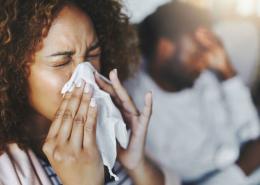Managing Your Mental Health During a Pandemic

The World Health Organization recently declared a pandemic in the wake of a global outbreak of the novel coronavirus disease (COVID-19). And while the majority of people affected by the disease will recover without any long-lasting consequences, there are many others who will suffer the short-term and long-term health effects of stress, anxiety and other mental health complications.
We all respond differently to stress and anxiety. Our response is often based on our family upbringing, background, or current life circumstances. According to the Centers for Disease Control and Prevention, people who may respond more strongly to the stress of this crisis include:
- Older people and people with chronic diseases, includingautoimmune diseases, who are at higher risk for COVID-19.
- Children and teens.
- People who are helping with the response to COVID-19, like doctors, other health care providers, or first responders.
- People who have pre-existing mental health conditions including substance abuse issues.
Also, due to government-issued quarantine laws and social distancing, many others who aren’t directly affected by the disease may suffer from the indirect consequences of self-isolation, such as depression and post-traumatic stress disorder. If you fall into any of these groups and/or you are feeling anxious about your exposure to COVID-19, you are not alone. It’s important to notice and accept how you feel, while creating space in your schedule to take care of yourself and your loved ones. First, look out for these common signs of distress:
- Feelings of numbness, disbelief, anxiety or fear.
- Changes in appetite, energy, and activity levels.
- Difficulty concentrating.
- Difficulty sleeping or nightmares and upsetting thoughts and images.
- Physical reactions, such as headaches, body pains, stomach problems, and skin rashes.
- Fear and worry about your own health and the health of your loved ones.
- Worsening of chronic health problems.
- Anger or short temper.
- Increased use of alcohol, tobacco or other drugs.
What you can do
If you notice that you are exhibiting a few of these common signs of distress, the following steps may help you take control of your mental and emotional health:
- Take care of physical health. Exercise regularly and don’t neglect your physical health during this time. Go for a walk, jog, do yoga, or just get moving. Even if you can’t get to the gym or go outside, research at-home workouts and enlist a virtual buddy. Eat healthy well-balanced meals throughout the day, including lots of fresh fruit and vegetables, and get plenty of sleep at night.
- Limit certain foods and drinks. Be mindful of the foods and drinks that you are taking in. Limit junk food and alcohol intake and avoid harmful substances like tobacco and drugs. Now is also a good time to limit your caffeine intake, especially caffeinated beverages such as coffee or tea as caffeine can trigger anxiety symptoms and interfere with your sleep.
- Take regular breaks from work. Even if you are working from home, it’s important to take regular breaks from your work and try to stay offline in the evenings as much as possible. Throughout the day, remember to take deep breaths and make time to stretch and relax your mind.
- Take a break from the news and social media. With the 24-hour news cycle and constant updates about the virus, watching the news or updates on social media can worsen your feelings of anxiety and fear. Take a break from watching the news and limit your use of social media to help manage your feelings and emotions.
- Stay connected to your loved ones. If you live alone and feel isolated, set up regular video conferencing or Facetime calls with your friends and loved ones to discuss your feelings and emotions, play games, or watch T.V. together.
- Reach out to a professional for help. If your feelings are persistent and last for several weeks, reach out to a member of clergy, a therapist, or a professional support group for help. Of course, if you have a preexisting mental health condition, you should continue with your treatment and be aware of new or worsening symptoms. Contact the Substance Abuse and Mental Health Services Administration for help at 1-800-985-5990 or visit their website at samhsa.gov.
References
- 1. Centers for Disease Control and Prevention. Stress and Coping.
- 2. Centers for Disease Control and Prevention. Taking Care of Your Emotional Health
- 3. Anxiety and Depression Association of America. Generalized Anxiety Disorder (GAD).





